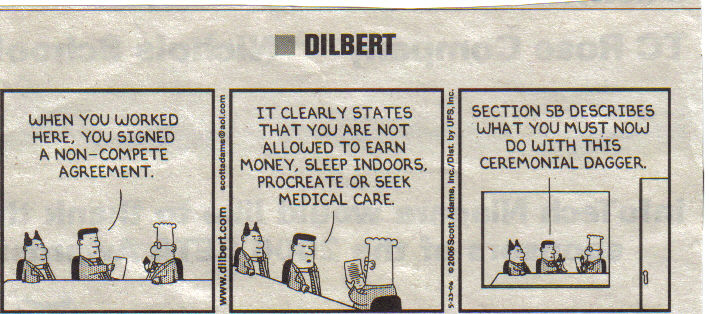
10 Feb Why Your Employees Should Sign a Non-Compete
Competition is key for innovation and growth in any market. However no small business wants to see its best and brightest employees leave and set up an identical business (or work for an identical business) down the proverbial block. While you cannot keep your former employees from competing against your company ad infinitum, you can limit the damage that might be caused by a former employee competing against you, especially if your business has important trade secrets or other proprietary information to protect.
The first step is having all new employees sign an iron-clad (i.e., effective and enforceable) non-compete agreement. A non-compete agreement is key for any thriving business looking to maintain an edge in a competitive market, by imposing restrictions on the employee after the employment relationship ends.
While the terms of a non-compete agreement must be tailored to the specific position, and will differ according to your state’s laws, there are some universally- key clauses your business will want to include in your non-compete agreement:
- A reasonable duration provision (e.g., one year)
- A reasonable geographic scope, or a limitation on the employee’s activities based on customer lists (if the employee works nationwide from one location) (e.g., California or all states where you maintained clients for the business)
- A tolling provision, which suspends or extends the restrictive period when the employee violates his obligations or the issue is being fought in court
- A provision that prohibits the employee from competing with/ preparing to compete with your business while employed
- A remedies provision, which details what kind of damages your business can receive if the non-compete agreement is breached
- A provision requiring your employee to notify your business of the employee’s new employer and the nature of the new position, and to require your employee to provide the new employer with a copy of the non-compete agreement
- A provision requiring mediation for any dispute arising under the non-compete agreement
- A provision requiring a specific state law to govern interpretation and enforcement of the non-compete agreement
- A provision requiring a certain state’s court system and a certain court location in that state to handle any litigation arising from the non-compete agreement
Now don’t try to simply copy and paste the above list into your agreement and call it good. In order to make sure you can enforce your non-compete agreement in your local court system, you will need to check your state laws on non-compete restrictions. Whether your non-compete agreement is enforceable will be a question of state law, and will typically vary from state to state. Generally, your non-compete must be reasonable in duration and scope, and should not be any greater than necessary to protect your company’s legitimate business interests.
One key issue that makes many non-compete agreements unenforceable is how much it restricts a former employee’s ability to “earn a living.” Most state courts will not enforce a non-compete that restricts employees beyond what is “reasonably required” to defend a legitimate business interest. Some states like California find non-compete agreements are void from the get-go, unless they fall under a narrow statutory exception. For example, you can enforce a non-compete in California when you are selling or dissolving a business. Otherwise, California really does not care how much of an impact your ex-employee’s competition has on your business’s livelihood. If you live in California or in another state with narrow permissions for non-competes, you will also need to invest time in drafting a solid confidentiality and non-disclosure agreement. We will dive into that agreement next week.
Also, a non-compete may not be enforceable in your business’s industry. For example, if you are a law firm, a non-compete is likely not enforceable against a departing attorney because this restriction could improperly prevent a person from retaining an attorney of their choice. You may have similar problems if your business is in the medical industry. In Texas for example, a non-compete against a departing physician is only enforceable if you provide the departing doctor with access to certain patient lists and medical records, and allow the doctor to buy out the non-compete at a “reasonable” price. Colorado is similar, allowing a non-compete if the employed physician agrees to the imposition of a damages provision in the non-compete, if they leave the practice.
Lastly, you will need to make sure your non-compete agreement satisfies the requirements of general contract law. For example, as an employer you must be sure to provide “something of value” to the employee, in exchange for that employee giving up his or her right to compete. This is called “consideration.” This may be hard to do when the employment relationship is “at-will” and you fail to have the employee sign the non-compete before beginning employment with your company. And in states like Texas, the offer of at-will employment is not sufficient consideration at all – the benefit offered to the employee must further the business interest being protected by the employer (e.g., providing highly specialized training designed to further the protection of your business trade secrets).
Edwards Law can help your company create a clad-proof non-compete agreement that will protect your company’s most treasured business information and ensure that you maintain that competitive edge in your market. Call us today for a free consultation.


No Comments